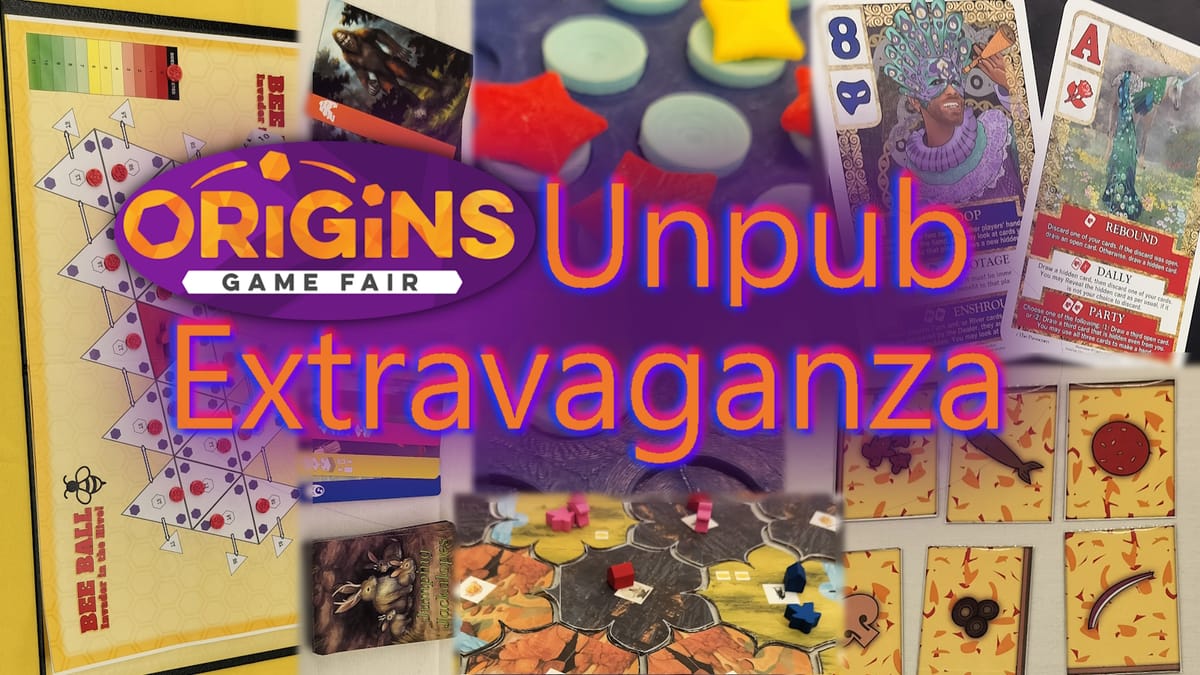
In the sheer amount of stuff available to see at a major board game convention like Origins, it’s easy to overlook the little guy. That’s where the unpub section of the con comes into play. In it, intrepid independent board game developers all sit eager to show off their games, and to get even more juicy playtest data from con-goers.
I only got to see a small fraction of the games available at unpub, but the creativity on display deserves a shout out! I want to be very clear that each of these games is still in active development, and any images, rules, components and even titles are very much work in progress across the board. Who knows how much these games will change on their way to store shelves. Think of this as a peek into board gaming’s future.
Bee Ball by Ed Wedig
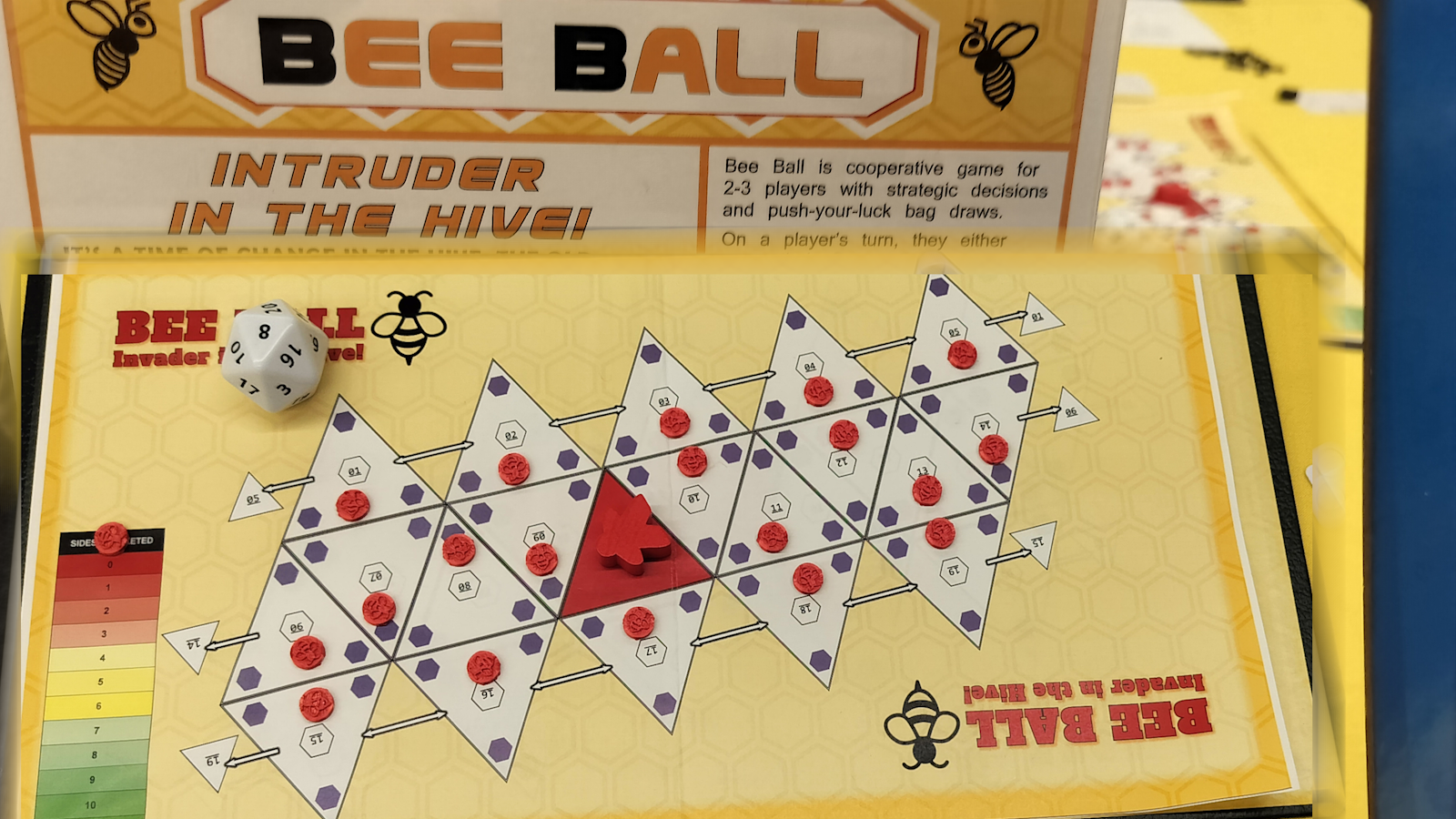
One of those interesting facts of nature is how bees deal with hornets. If a scout hornet found a hive and returned to their own nest, they’d summon the swarm to get a bunch of free bee protein. To stop this, bees form a ball around the wasp, then vibrate violently, causing the ball to heat up, cooking the wasp inside.
That’s the concept of Ed Wedig’s Bee Ball, a cooperative game about a bee hive defending itself against a wasp scout. The board is basically a dodecahedron (a d20 to fellow tabletop nerds) layed flat. This represents the ball the bees are beginning to form around the wasp, while the wasp moves around looking for a way to get out, taking out bees as it goes.
Each player will have an opportunity to bring in additional reinforcements before the wasp jumps to another location, as determined by a d20 roll. It kinda plays like an area control co-op game against a single big enemy.
Jumping Jackalopes by Shoot Again Games
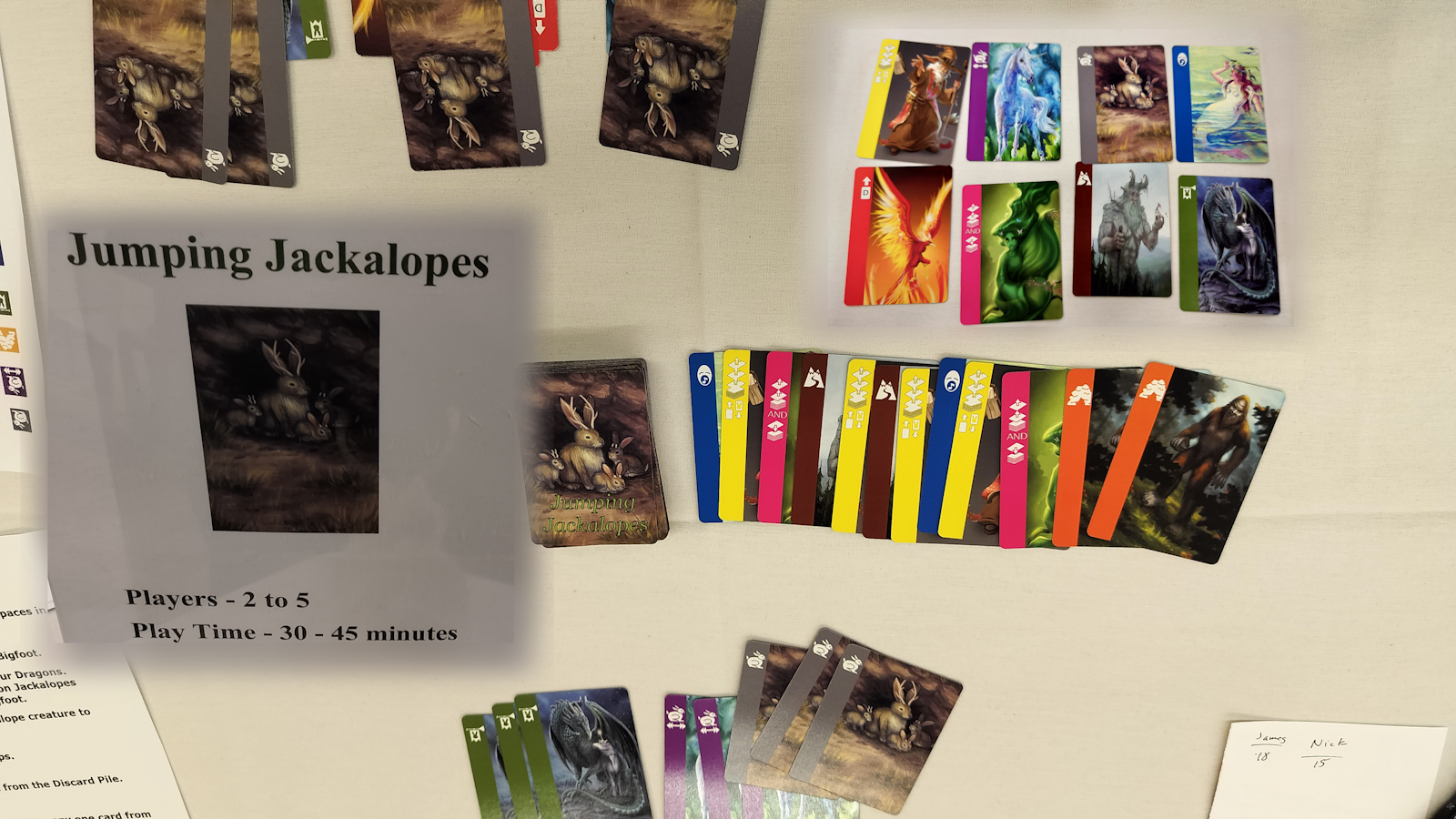
Jumping Jackalopes is a Rummy style tableau builder, where players build a map around the table, which becomes an environment for the other cards they play to interact with. Players take turns drawing and playing their fantasy cryptids in sets, with each card possessing some sort of power, such as stealing cards from other players, creating obstacles on the map, or moving the titular Jackalopes. See, the major share of the points come from Jackalopes, which move around the map created by the cards each player plays in front of them. Each one provides more points than any other creature combined, but it’s often hard to predict where they’ll wind up. In a 2 player game, it felt like each card played was a tactical choice, but I think in higher player counts, the chaos will be just right for a great party game.
Starfarer by Michael Barrowes
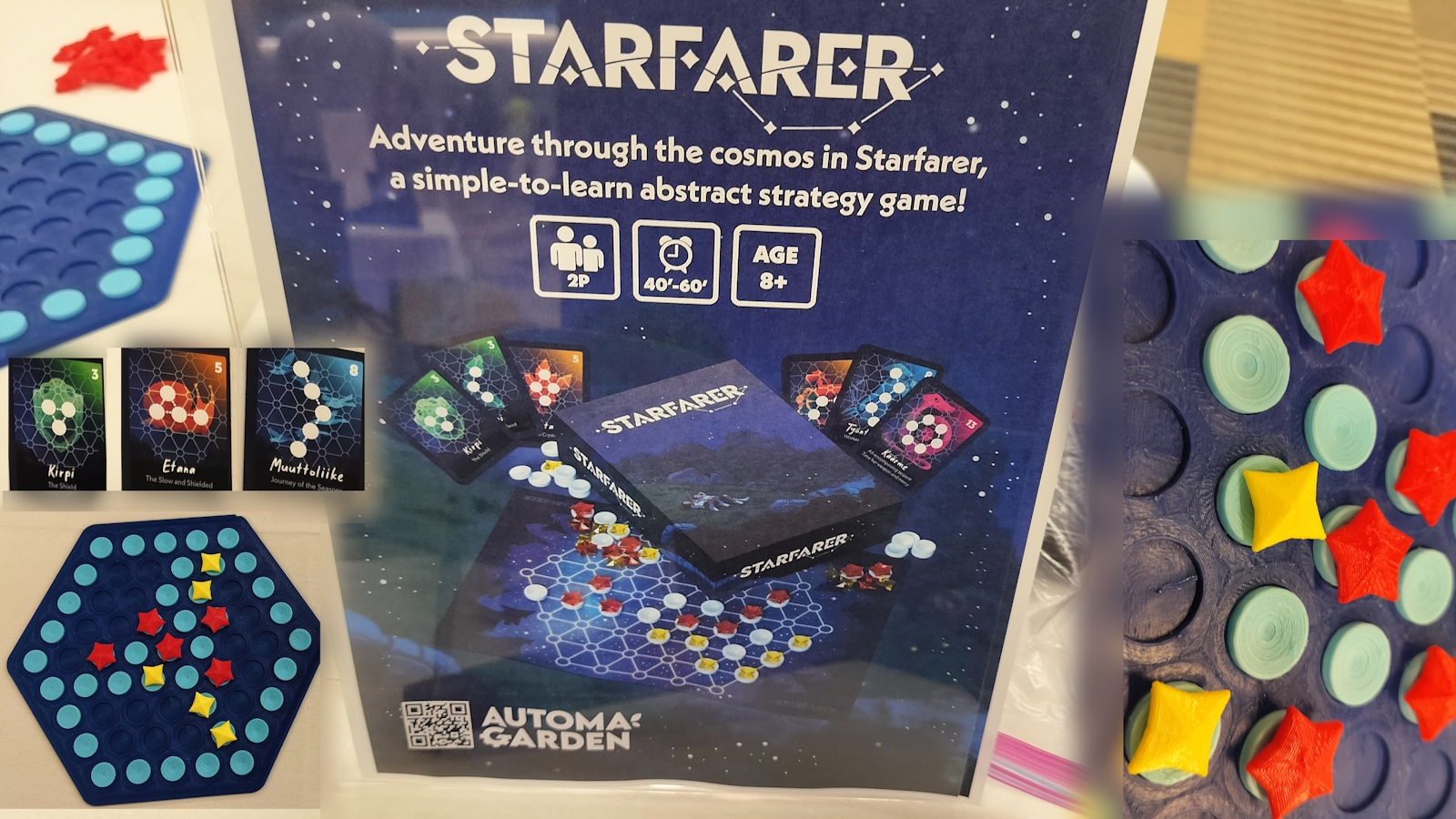
There are some games that look charming, but hide what I call the “bastard twist”. What I mean by that is that it hides a twist or mechanic that is pure evil. Starfarer has that twist. It appears on its face as a light, breezy game about making constellations in the night sky. Each turn, a player can place a new star in the sky, represented by a star token matching their color, as well as a neutral colored base to indicate that this star has been “spotted”. When one player matches one of the public facing star cards, they can claim it, and remove their colored pieces from the neutral ones, leaving behind “used up’ stars.
The twist comes from the fact that if a player can draw a straight line of used stars between 2 of their own stars, they can drop a star on each of the spaces in between. Add to that a rather strict component count, and players find themselves maneuvering to block each other from completing constellations, creating combos that allow them to draw lines multiple turns in a row, and holding onto completed constellations until the absolute last second to prevent the other player from having the space to play. I’ve never seen a game go from charming to hardcore so quickly!
Hold’em Havoc by Taran Harmon-Walker
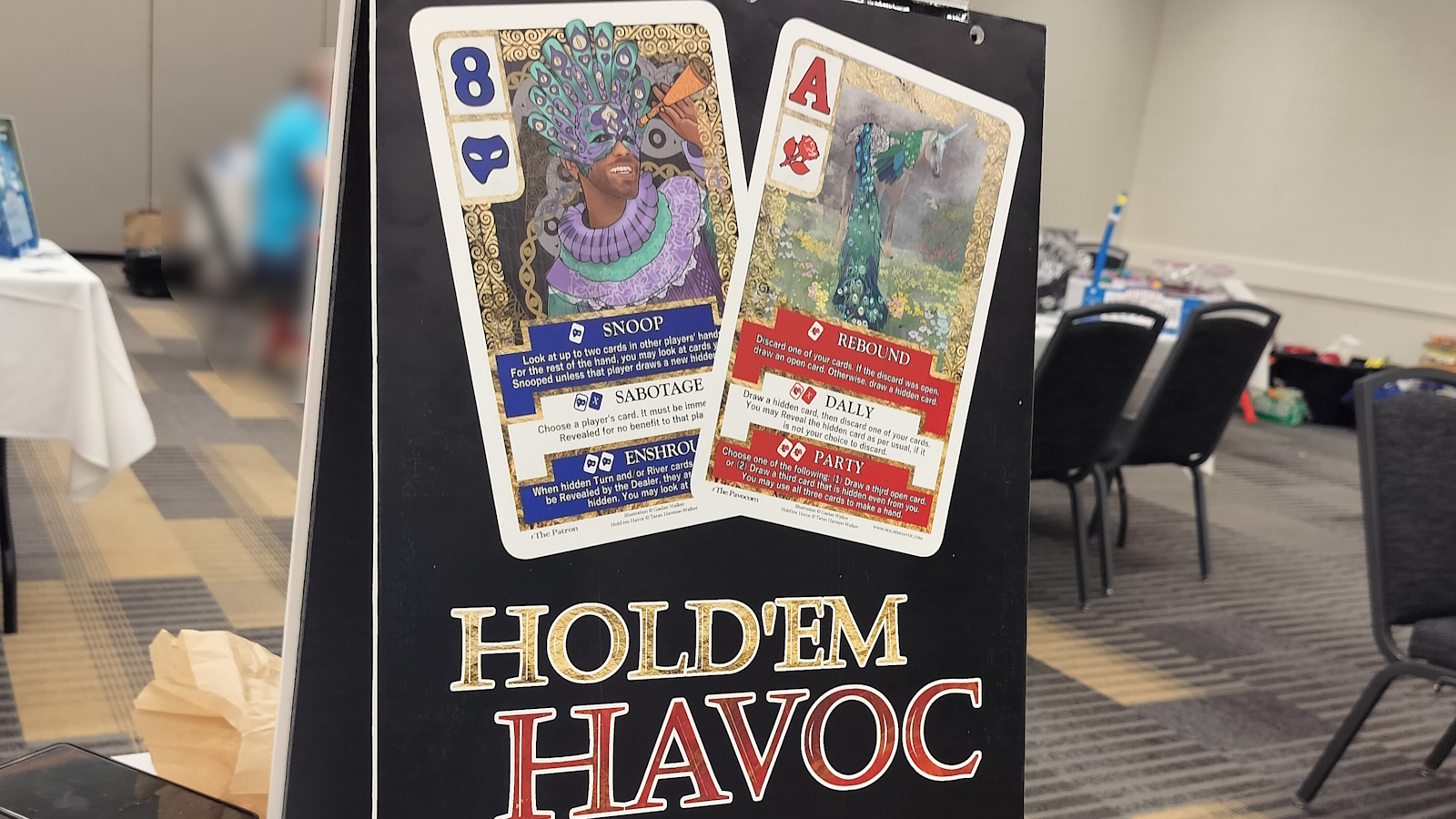
Hold’em Havoc is best described as “what if Texas Hold’em, but powers?” If the recent success of Balatro is anything to go by, the basic mechanics of poker are ripe for alteration and improvement. Hold’em Havoc does this by creating special powers for each suit of cards, a total of 3 powers for each. To activate a power, a player simply reveals one or both of their cards. Revealing one of the same suits creates a weaker effect, revealing two cards that are off-suit creates a medium effect, and revealing a pair of the same suit creates the strongest effects.
Obviously, this is a dangerous game, as the most important resource in poker is information. In exchange, however, you might get a free bid, or the ability to peek at another player’s hand, or other, even stranger effects. Taran only showed off 4 suits for me, but he indicated that he had multiple extra suits, so you could customize a game of Hold’Em Havoc with any number of exciting powers. Each suit also featured art from unique artists, giving each its own flare and style. Finally, a simplified betting system with only a handful of chips allows bluffing to happen while getting out of hand with the powers available.
My photos of the cards themselves came out super blurry, unfortunately, so check out the website instead!
Pizza Roles by Tom Mathews
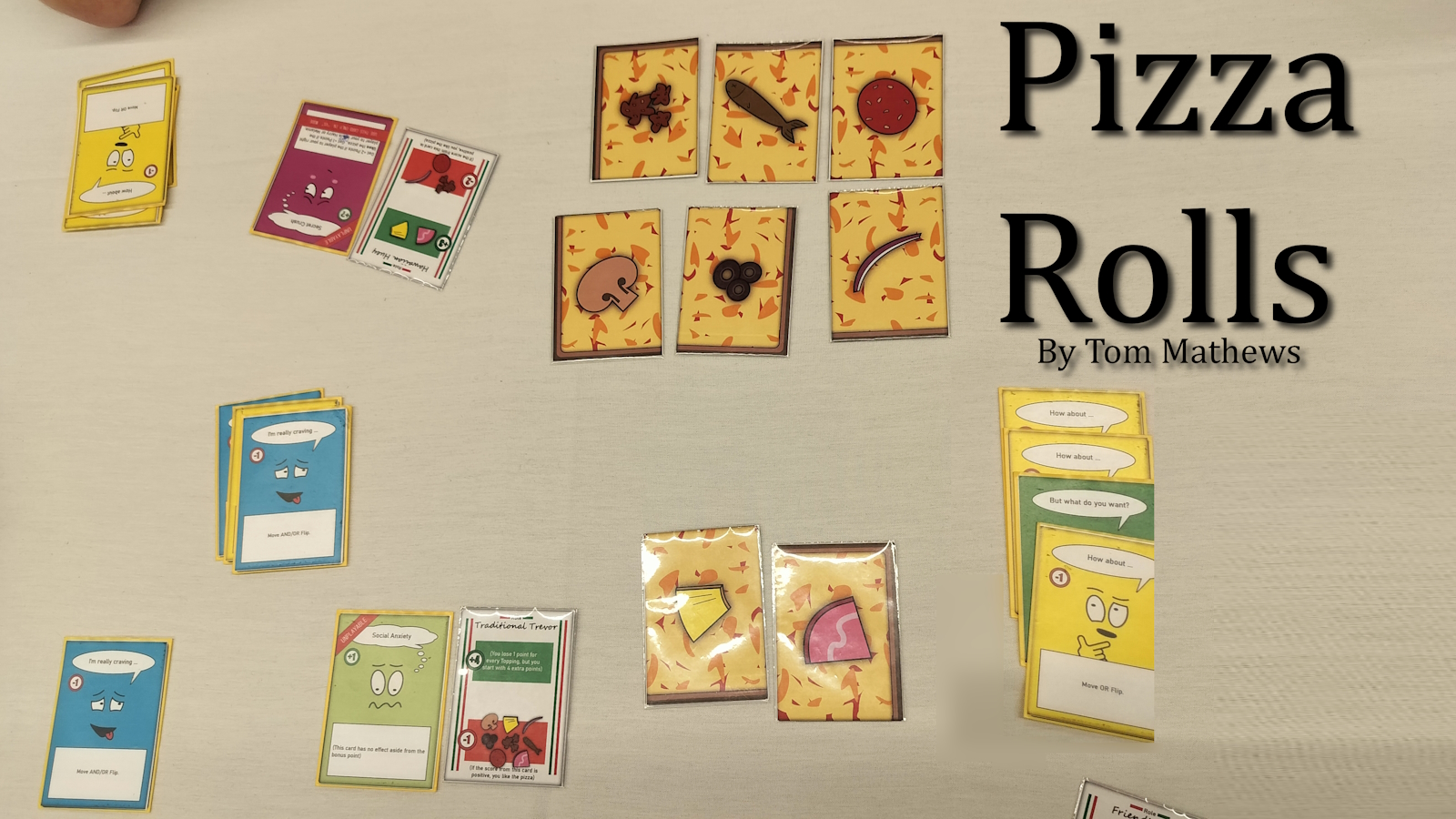
Ever hang out with your friends, and someone says “we should get pizza”, and everyone agrees, but no one seems to want to agree about what kind of pizza they want? That’s exactly what you get in Pizza Roles, the passive aggressive hidden role game. Players each receive a hidden role, and a hand of cards that they can use to change what kind of pizza is going to get ordered, and that’s the only way to really communicate what you really want. Each game can have multiple winners, as each role provides a specific scoring system based on various toppings. All you need to do to be part of the winners is have a positive score in the end. There’s also a few roles that are there to throw a wrench into things, such as the jerk who wants as few people happy as possible.
Galactic Alliance by David Sevier
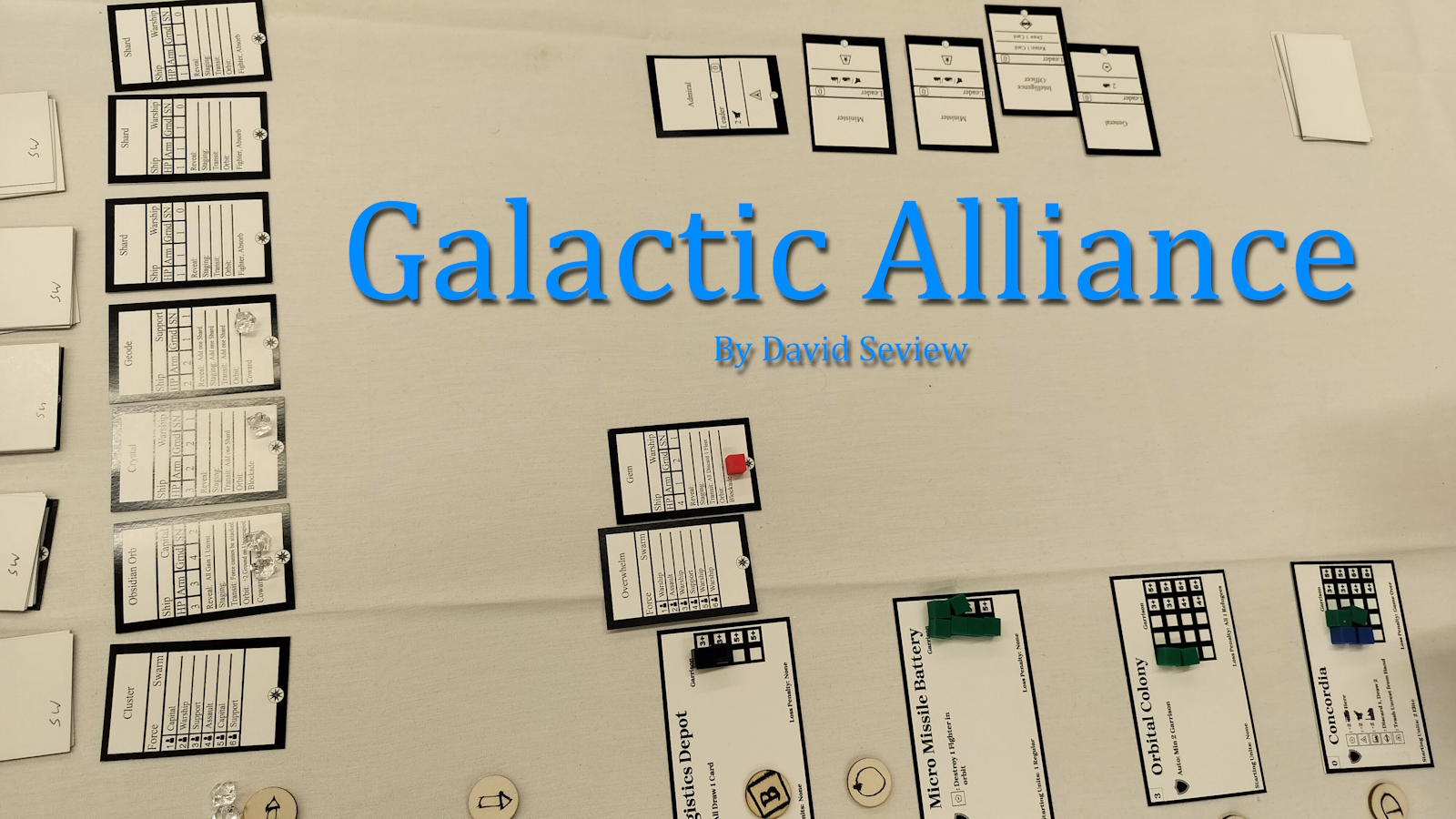
Galactic Alliance is an asymmetric co-op deck builder with a tower defense like system. Each turn, players play out their hand in standard deck builder fashion, using resources to beef up their deck in the future while using abilities, ships, and troops to build shared defenses against an incoming alien armada. Each player gets to choose a unique starting deck, where some of the best cards available in the game are those you start with. These special leader cards define your initial abilities, and players are incentivized to build around those cards.
Each incoming ship of the alien armada is best dealt with in different ways. Some require large single hits to take down, like flagships, while others swarm and are best dealt with in small hits. Others are hard enough targets, it’s best to wait until they drop their troops off on the planet and deal with them there. Multiple different enemy armada’s means that the challenge can change, so your strategies need to adapt from game to game.
Window Washers by Crazy Like a Box
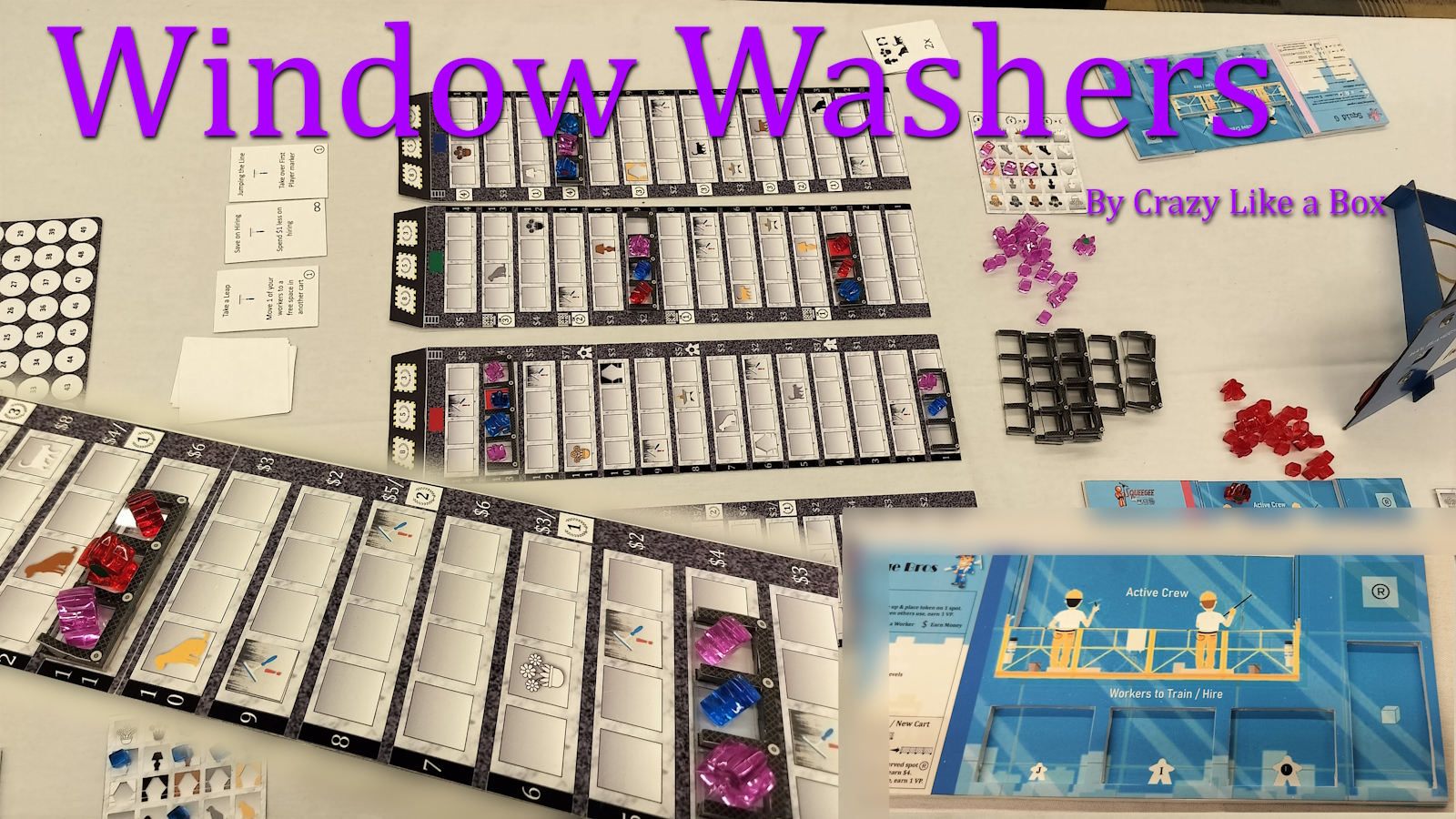
Window Washers provides an interesting puzzle. It mixes worker placement with some minor programming and prediction to create little point engines each round. Players will take turns choosing places on window-washer platforms, and each worker placed will move the platform up depending on the strength of the worker. On the buildings are symbols providing scoring and resources, which can be used to further upgrade the workers, their equipment, and the scaffoldings themselves. Finally, points are also attributed to the workers making their way to the top of each building first. Because of the intricate dance of platforms on skyscrapers, timing is everything.
Blood and Stone by Trey Chastain
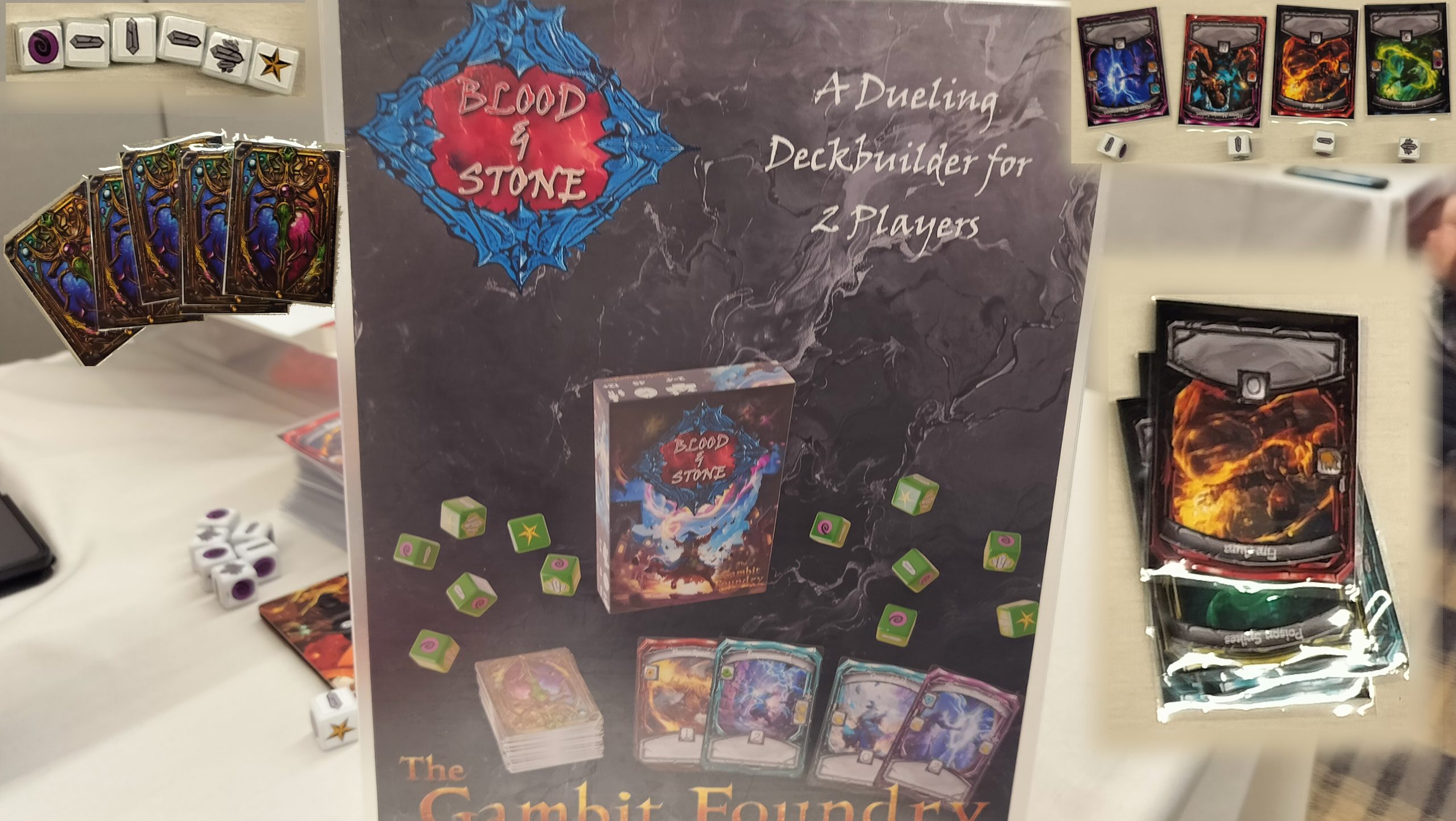
Blood and Stone is a magical deck builder. Each turn, players roll a bunch of dice that can be used as resources. Some resources provide power to play cards, others additional mana to buy more cards from a fast moving market. Each player is only allowed to play one card a turn unless they can combo it by playing another card (and paying for it) that shares a color with the card played before it. This enforces certain archetypes onto players, leading them to play into certain colors. The starting cards are basic, but each is a different color, along with black, which makes them kinda like glue for the rest of your deck. Once you have a deck you like, you can use your mana to cast directly from the market instead of spending it on fattening your deck.
Primacy by Alex Wolf
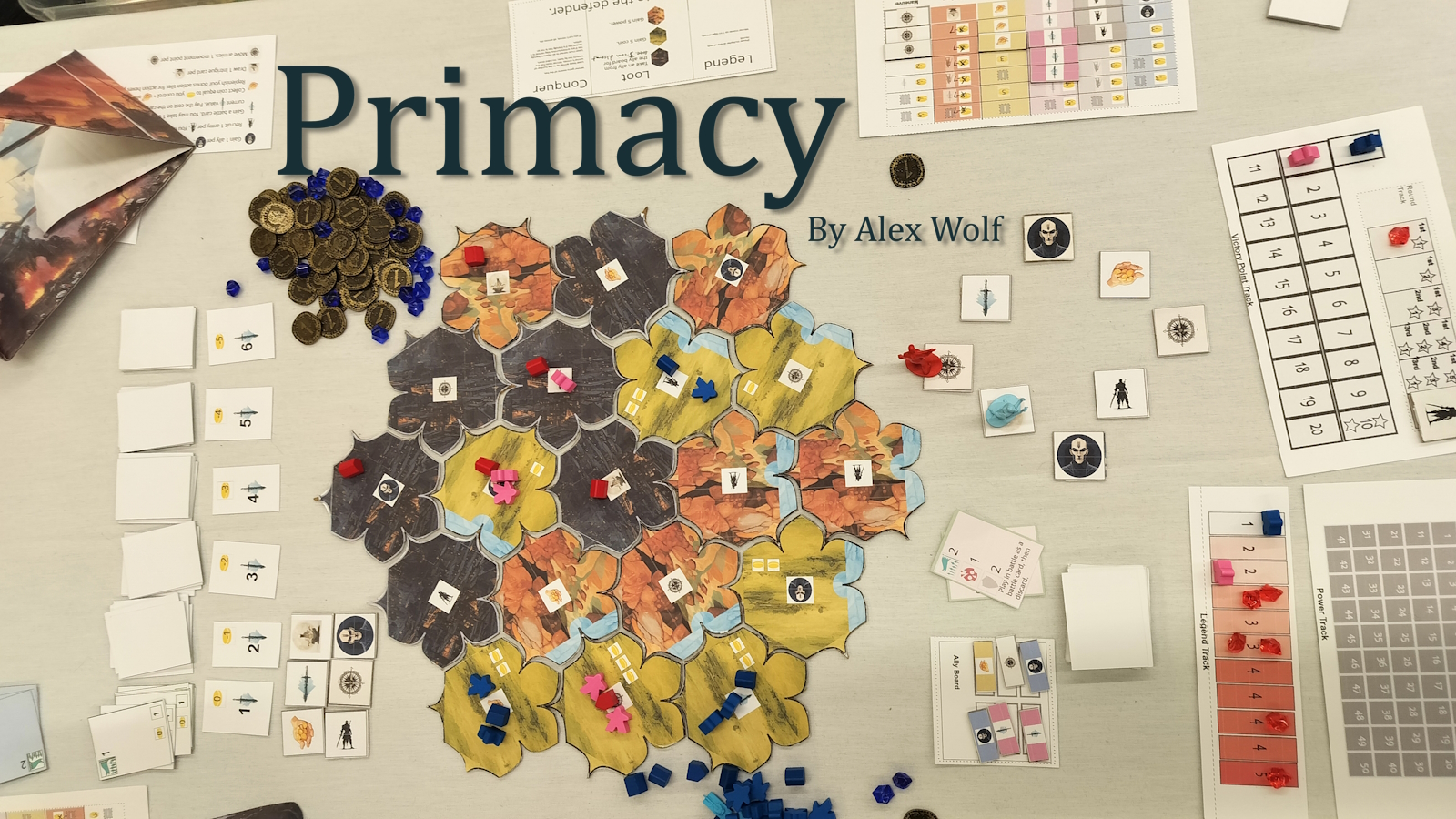
This one is a bit of a cheat on this list, since unpublished games are, by their nature, lacking a publisher. Alex Wolf of Spielcraft Games is already an established game creator and publisher, but brought his newest game Primacy to Origins, so I figured I’d mention it here.
Primacy is a territory control game with an engine builder powering it. Each turn, players can move around a rondel, choosing an action within their movement range. This lets them create armies, buy battle cards, improve their faction engine or earn coins to do all of those other things. Of course, every action is tied to the player’s engine and to the boardstate at any given time.
Finally, the battle system of the game is unique. Each battle, players can fight for Legend, Conquest, or Loot. Legend earns points, Conquest claims territory and eliminates forces, and Loot earns money for future conflicts. Players can dedicate strategy cards to each of these options at the cost of money for each card played, so even a dominating victor can often only take 2 of the three options in combat. It also means that a losing force can still take something away from every battle. In fact, fighting is often worthwhile even when you know you’ll lose badly, as long as you play your cards right.
